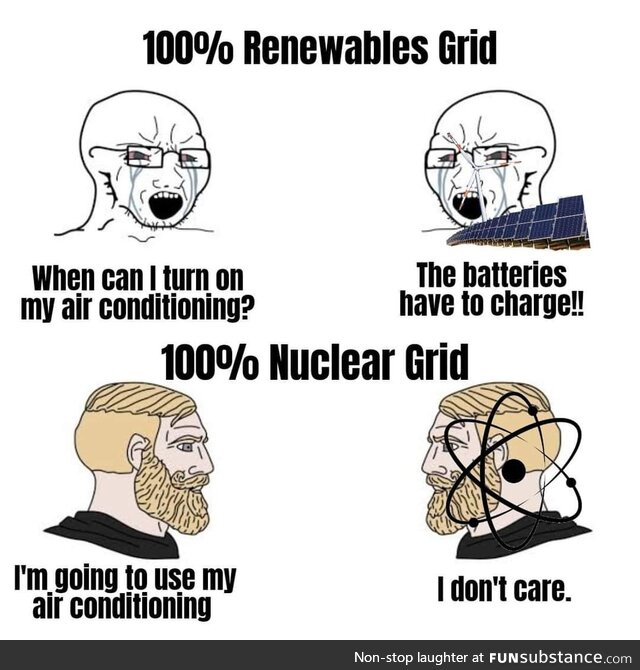Featured Posts

I wish I had a fort

The powerof positive thinking

NASA

Pray for Australia

Take care of each other

She has emerged

My soul feels so much better

I just ordered one. #Just2019HispanicThings

He really wanted his photo at the Halloween party, but was super scared of the spiders

The Only Thing More Contagious Than COVID19 Might Be This Fox's Smile
About
FAQ
Contact
Rules
Terms
Privacy
Feedback
Keyboard Shortcuts:
Previous Post · Next Post · + CTRL Skip Post
Previous Post · Next Post · + CTRL Skip Post
© 2025 FunSubstance · funny and entertaining pictures, memes, gifs & videos.



That said- nah. If you’re somewhere hot and humid you can’t “run it a few hours.” Especially older homes and systems. With the AC full blast all day AND portable AC units in key rooms my sisters house a few weeks ago was 90f inside.
More modern and efficient homes might be able to make do, but if you don’t have good insulation and design you basically either run it all day or don’t bother running it at all.
But I’m with you in principle that not running AC unnecessarily is something almost anyone can do.
By the same token is is generally much easier to get warm in the cold then get cool.
I live in Australia, I know what a 40C day is like
I have long qualified for a handicapped parking placard, but I do not have one. I Park in regular Spaces and walk. I feel perfectly able to.
Were I to see someone in my same or similar condition who did use one, it wouldn’t make much sense to admonish them and tell them that if I can walk they can. How do I know what they can handle? Our circumstances may be similar or the same, but not identical. And we are not identical. So I don’t disagree in that I find AC wasteful and overused, but I do disagree in that I can’t dictate to everyone else what their tolerances or needs or perceptions or
Of course I favor some sort of prohibitively complex and difficult to quantify system of “points” where in regardless of wealth all people are allocated points. Each action of impact has a points value. Drive a 7 person suv alone or roll coal of you want- but that will leave you few points for plastic straws or AC or steal dinners. Leave the lights on, fill your pool, water your lawn. It’s a numbers game. As the global population increases and the standard of living does, the total resources can’t keep up and still be allocated in the same amount to each person. We need less people or less use of resources, but if 7 billion people all throw one piece of small trash on the ground, it’s still a big problem. Our individual impact is magnified by sheer numbers.
Less than 20% of the worlds population will ever set foot on an airplane and take flight. Contrast that to 90% of Americans who have flown or will fly in their lifetimes.
A very small percentage of the global population consumes a majority of the worlds resources, and while among us the rich corporate bastards and such are the lions share. Of course- as far as industry goes that is largely to feed our appetites. They don’t run giant factories to make things that people don’t buy- or not for long generally.
So on the one hand it is convenient to pin it on the “elite,” most revolutions in history have overthrown the rich bastards and replaced them with leaders who inevitably became rich bastards themselves or already were rich bastards- or at least bastards without the money to be the assholes that their nature intended them to be.
So it is largely prudent to tackle those “elite” few and move down the chain from there.
While examinations of ideas like wealth distribution and such show is that there is little of any practical per person benefit to targeting the wealthy- it is true that a single factory can produce more environmental impact or pollution in a day than some people will in a lifetime.
It is also true that merely removing a single cross continental flight can offset the pollution of quite a few people. One transatlantic flight for one person can easily be greater than or equal to all their other polluting behaviors in an average year.
So while industry and the mega wealthy are prime targets and should be focused on, this ain’t a case where the “average” citizen of a developed nation is small potatoes. If we look at a single snapshot of Americans- where 90% will fly at least once, that’s almost 300 million years worth of individual pollution added to the environment for what is largely non essential travel. And of course many Americans travel for business and pleasure frequently.
But people don’t like change in general and don’t like to give things up.
So they try to find changes that on an individual and systemic level will produce the least “pinch” or disruption. The spice must flow, the rich bastards want their billions and the upper middle class bastards want their millions and all the other bastards want distractions and comforts and all of them all the time.
AC can be a comfort but for many- especially the elderly or those at risk- heat can kill, so it can also be a necessity. Those who can do without certain things likely should. That said- bastards are very bad at distinguishing want from need.